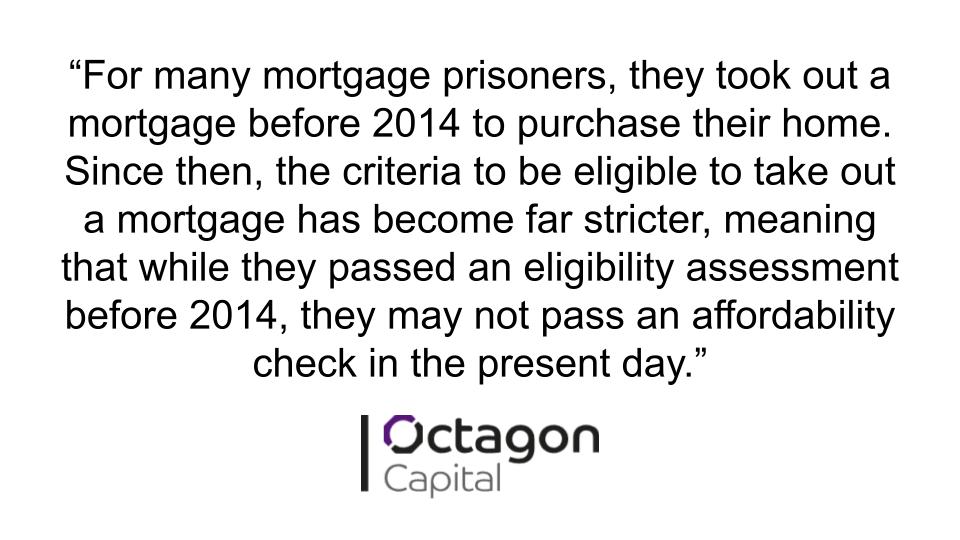With the current cost of living crisis, many people feel like as soon as they see a better deal they need to take it. This applies for mortgages too, but unfortunately not for every mortgage holder. Some people find it incredibly difficult to make the switch with their mortgage from a bad deal to one with a better deal – essentially making them ‘mortgage prisoners’.
Mortgage prisoners can become stuck in their current mortgage for a variety of reasons, and each case is different. However, in this Octagon Capital guide, we discuss what can be done to help mortgage prisoners swap to a better mortgage deal, as well as how to identify if you could be a ‘mortgage prisoner’.
What is a Mortgage Prisoner?
A mortgage prisoner is a person who finds it incredibly difficult to switch their high cost mortgage to a new one with a better deal, despite being up-to-date with their mortgage re-payments.
For many mortgage prisoners, they took out a mortgage before 2014 to purchase their home. Since then, the criteria to be eligible to take out a mortgage has become far stricter, meaning that while they passed an eligibility assessment before 2014, they may not pass an affordability check in the present day. The newer affordability assessments consider both your income and your expenses to more accurately assess if you can afford to make the repayments on the mortgage in question.

Estimates from Money Saving Expert suggest that staggeringly, there could be up to 200,000 mortgage prisoners in the UK. These people are all borrowers who have taken out mortgages with now inactive firms who are no longer offering mortgages to new customers – borrowers in ‘closed book’ mortgages. The Financial Conduct Authority (FCA) suggests that of this group of mortgage prisoners in the UK, around one in three “should” be able to make the switch to a better deal.
It can be incredibly difficult to accurately report on the amount of mortgage prisoners at any one time, as many may not be aware that they could be getting a better deal elsewhere. As such, we’ve broken down how you can determine if you might in fact be a mortgage prisoner, unknowingly tied into a high-cost mortgage.
Am I a Mortgage Prisoner?
Many people only find out that they are in fact a mortgage prisoner when they decide to try and find a lower cost mortgage and realise that they are unable to do so.
When trying to figure out if you could be a mortgage prisoner, consider your answers to the following two questions:
- Did you purchase your home, or remortgage it, before the introduction of the stricter affordability rules in 2014 that we mentioned earlier?
- Have you been told in the past you can’t switch to a more competitive, cheaper deal?
If you find yourself answering “yes” to both of these questions, there is a strong chance that you could be a mortgage prisoner.
It can be hard to wrap your head around mortgages and the process of changing your mortgage, let alone if you’re a mortgage prisoner. We’ve included some information about the things that can help mortgage prisoners in their situation.
What Can Help Mortgage Prisoners?
The FCA introduced changes to the rules and regulations surrounding mortgages in October 2019, meaning some borrowers could be able to switch over to a more competitive and affordable mortgage. The FCA’s rules check your mortgage payment history, rather than solely considering the affordability of your mortgage.
If this applies to you, you will have received an official letter before January 2020. This letter will confirm that you are unable to switch mortgages to a more affordable deal, and that you might be able to benefit from these changes to regulation. Please note: having received a letter does not mean you are automatically eligible to switch your mortgage to one with a different lender.
Do I qualify to switch mortgages under the new rules?
If you have received the letter confirming you are unable to switch mortgages to a better deal before January 2022 and apply to switch your mortgage, lenders will use different criteria to decide whether they will accept your application.
As we mentioned earlier, the FCA uses a different criteria to the one previously used, opting to consider a person’d mortgage payment history as well as their affordability. It’s likely that lenders will want to know about your repayment history, as well as your repayment plan.
The criteria used to determine if you can swap your mortgage to a different lender vary from lender to lender, but according to Money Helper, might include: a copy of the ‘mortgage prisoner’ letter, a minimum of five years remaining on your mortgage, at least £50,000 remaining on your mortgage, a minimum property value of £60,000, a LTV of no more than 85%, not having a buy-to-let mortgage, no changes to who took out the original mortgage, no missed mortgage payments and a clear repayment plan.
